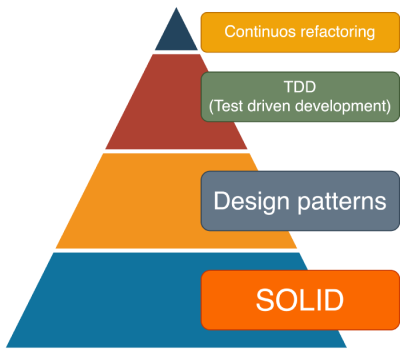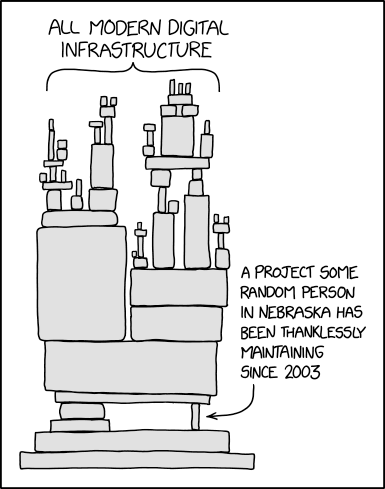Write Clean Code — or else …
Monday, December 13. 2021
Anybody who has written any significant amount of code into a software project will (painfully) eventually learn how the code should have been written in its early days.This phenomenon has happened to all of us and will keep happening as long as any code is being maintained.
Experienced developers know how to fight this code "rot", or debt. Here is a really good diagram on how to maintain code quality.

Credit: Artem Diashkin, 2020, https://medium.com/litslink/solid-software-design-principles-ac5be34a6cd5
So, four things:
- You must work with you code all the time to improve it. Preferably not the same exact code, but your codebase in general.
- Without automated tests, you'll be lost. Getting 100% coverage isn't easy and not the actual target even. Have SOME coverage at minimum.
- Implement sensible design patterns, have the factory factory if its applicable for what you're doing. Avoid over-kill, you don't need a factory for everything as it makes your #2 difficult requiring more #1.
- S.O.L.I.D.
- Single Responsibility Principle
- Open Closed Principle
- Liskov Substitution Principle
- Interface Segregation Principle
- Dependency Inversion Principle
Especially #4 is very difficult. Nevertheless, you need to aim towards it.
As reality bites, what happens if you don't do all of the above. Well ... shit will hit the fan. A really good example of things going wrong is Log4Shell.
Christine Dodrill in her post "Open Source" is Broken or: Why I Don't Write Useful Software Unless You Pay Me explains how huge corporations use work of non--paid volunteers while failing to direct any money towards them. When things go wrong or seriously wrong, everybody will blame those non-paid people for not doing their jobs properly. Note how I write "jobs". It was never their job, it was their hobby, something they do in their spare time.
Whatever code you work on, eventually your end result will look as this XKCD #2347 depicts:

When that tiny piece crumbles, the poor Nebraskan will get the blame. Nobody offered to help before it happened, though. We had a taste of that in 2016, How one programmer broke the internet by deleting a tiny piece of code. Last month it happened again.
Everybody wanted to use Apache Log4j, nobody wanted to pay for it (actually, three users did). What these non-paid volunteers maintaining the code didn't do was have the discipline. Pyramid of clean code wasn't applied, or wasn't properly applied. They didn't bother, entire project was simply something they did on their free time. With lack of discipline, legacy version's and what not, the worst was not applying S.O.L.I.D.'s S. The same piece of code that should write the requested log entry to a log destination also does parsing of the message. That's two responsibilities, not single.
From proof-of-concept Java-code:
log.info("This is what we got:{}", someData);
Whatever the variable someData contains, by Single Responsibility Principle, no parsing must be done and any input, for example ${jndi:ldap://127.0.0.1/a}, must be taken as literal. Because of test code coverage, lack of refactoring, not using design patterns properly and lack of S.O.L.I.D. design all hell broke loose.
Internet burst into flames!
Next time you, as a software architect, designed, developer, whatever plan on adding an implicit functionality to your existing code, make sure everybody who will ever use your new toy knows of this dual-responsbility. Inform all of this implicit functionaly and how it will effect. Don't hide a parser somewhere where there should be no parser, have it a separate operation even if it will break prople's legacy applications. Doing this will keep your days boring and Internet not bursting into flames. The bad thing, obviously, is your notoriety will reamain low as nobody will ever know of your really cool feature.
My advice is:
Have it that way rather than being the underpaid guy whose code broke everything. Really, broke everything.

